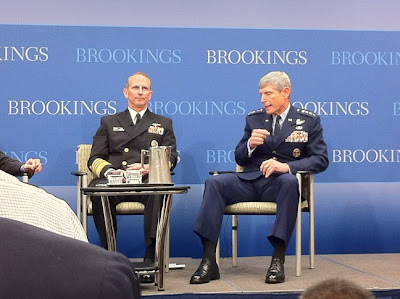Thoughts on Air-Sea Battle Briefing at Brookings
When Secretary of Defense Leon Panetta introduced the new strategic guidance for the Department of Defense, he stated that the “smaller and leaner” Joint Force of the future must be prepared, in conjunction with allies and partners, to confront and defeat aggressors anywhere in the world, “including those seeking to deny our power projection.”
The new strategic guidance directs U.S. forces to maintain the “ability to project power in areas in which our access and freedom to operate is challenged” and to be “capable of deterring and defeating aggression by any potential adversary...
With Air-Sea Battle, we are reinvigorating the historic partnership between our two departments to protect the freedom of the commons and ensure operational access for the Joint Force.
Air-Sea Battle provides the concepts, capabilities and investments needed to overcome the challenges posed by emerging threats to access like ballistic and cruise missiles, advanced submarines and fighters, electronic warfare and mines...
Air-Sea Battle relies on highly integrated and tightly coordinated operations across warfighting domains—for example, using cyber methodologies to defeat threats to aircraft, or using aircraft to defeat threats on and under the sea. During the Brookings event, the General and the Admiral were careful not to mention China at all. In fact, I checked the transcript and didn't read either of them saying that word, although reporters asked them about China.
I don't have a problem with that, although I think it's a little disingenuous. The remainder of the American Interest article explains a variety of so-called A2AD scenarios, while also never saying "China." It does mention Iran, however.




Comments
WSJ: Updated July 6, 2012, 9:48 a.m. ET
Pentagon Digs In on Cyberwar Front
Elite School Run by Air Force Trains Officers to Hunt Down Hackers and Launch Electronic Attacks